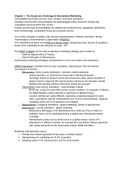Chapter 1: The Scope and Challenge of International Marketing
Controllables are things such as: price, product, promotion and place.
Domestic environment uncontrollables are political/legal forces, economic climate and
competitive structure within the country.
Foreign environment uncontrollables are political and cultural forces, geography, distribution,
level of technology, competitive forces and economic forces.
The country analysis considers only relevant external factors: Political, Economic, Social,
Technological, Environmental & Legal factors (PESTEL).
The competitive analysis is the Porter’s 5 forces model: bargaining power (buyers & suppliers),
threat (from substitutes & new entrants) & rivalry: 4Ps.
The SWOT analysis can be used to develop a marketing strategy and consists of:
- External Opportunities & Threats
- Internal Strengths & Weaknesses
Avoid basing marketing strategies and decisions on your own culture and experience.
EPRG Framework: classifies firms by their orientation, depending on the international
commitment of the firm.
- Ethnocentric: home country orientation - domestic market extension
- Harley Davidson: an all American brand with multinational appeal.
- Its foreign market is similar to home and shares the same values, therefore it
doesn’t need to adapt the 4Ps and its priority still lies on the domestic market.
Markets with demand similar to the home market are pursued
- Polycentrism: host country orientation - multi-domestic market
- Mr.Proper: product brands differ across country markets. For example, in Mexico
it’s called Maestro Limpio whereas in Germany it’s Meister Proper.
- Country markets are vastly different, warranting a tailored program for each.
Here, subsidiaries operate independently and control is decentralized. Separate
marketing mixes and 4 Ps decisions are localized.
- Regiocentrism: a regional orientation - global marketing. Similar to geocentrism.
- Geocentrism: a world orientation - global marketing
- McDonald’s: McVeggie in the Netherlands and a McCurry Pan in India, for
example. Here a firm’s marketing activity is global with international market
coverage.
- Standardized product and a similar price to a global market. Some 4 Ps
adaptations in different markets, for example the local dishes. Market segments
with similar demands for the same basic product. NIKE and IKEA.
Marketing internationally means:
1. Finding new market segments for the same or similar product
2. Standardizing the marketing mix (4 Ps) if possible
3. Adapting certain 4 Ps components to suit the local market
, Professional qualities are required: objectivity is key - avoid self-reference criterion. Understand
cultural differences and have a knowledge of cultures, history, world market potential and
trends.
Marketing concepts are largely universally applicable. The goal of a business is to generate
profit by promoting, pricing and distributing products for which there is a market. As a result, the
difference between domestic and international marketing lies not with different concepts of
marketing, but with the environment within which marketing plans must be implemented.
Alien status is the increased difficulty of properly assessing and forecasting the dynamic
international business climate. 2 dimensions to the alien status of a business:
1. Alien in that the business is controlled by foreigners
2. Alien in that the culture of the host country is alien to the foreign country
Environmental adaptation: to adapt business and marketing strategies to dynamic international
markets. The process of environmental adaptation entails modification and alignment of
controllable variables, such as the marketing mix, to each international market. This serves to
reduce and absorb the impact of the various uncontrollable elements.
According to Levitt, the company of the future will be a global company that views the world as 1
market to which it sells a global product, a high-quality, reasonably priced, standardized product.
- Levitt argues that segmenting international markets on political boundaries and
customizing products and marketing strategies for country markets or on national or
regional preferences are not cost effective. As a result of mass communication, many of
the regional differences that once existed have now been eliminated in the EU.
- To some extent, people in other cultures exposed to the same influences will
react similarly and there’s a converging commonality of the world’s needs and
desires: for example, the number of languages is decreasing.
Marketing internationally should mean: looking for market segments that can be satisfied with
the same product, standardizing certain components of the marketing mix if possible and
adapting the marketing mix to suit the country’s culture in which one is operating.
There are 5 global trends affecting business today:
1. Globalization of production and consumption
2. Growth of free-trade areas like the EU & NAFTA
3. Enhanced purchasing power throughout the world
4. Evolution of large emerging markets (BRIC)
5. Advanced methods of communication and transportation
With the increasing globalization, companies find they are unavoidably enmeshed with foreign
customers, competitors and suppliers, even within their own borders; Lidl is German.
Marketing relativism is marketing strategies and judgements are based on experience, and
experience is interpreted by each marketer in terms of his or her own culture and experience.






